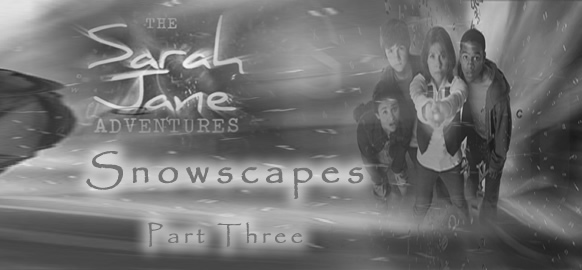
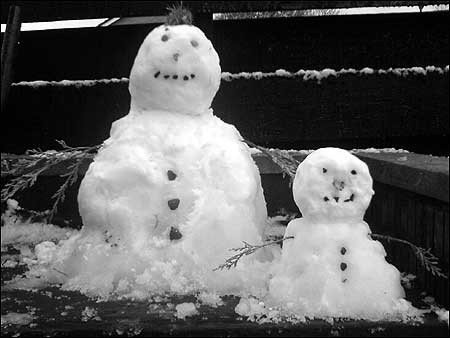 Luke
put the finishing touches to the last snowman and then turned to go back
to the house. It was snowing hard again, and he wondered if snowmen could
get snowed up.
Luke
put the finishing touches to the last snowman and then turned to go back
to the house. It was snowing hard again, and he wondered if snowmen could
get snowed up.
He could barely see the house. It seemed a long way off through the driving snow, and his feet sank down into the deep layer of it as he walked. Trainers weren’t really right for walking in snow. His feet were cold. He was cold all over for that matter. He hadn’t realised just how much. Something had just driven him to make the snowmen. He knew there was a reason. As he worked he felt there WAS a reason, but he didn’t know what it was, only that if he didn’t do it, something terrible would happen.
Now he was cold, very cold. And he longed to get back into the house and to the nice warm sofa bed in the centrally heated room.
But the house wasn’t there.
He reached out and touched the brick wall in front of him. It WASN’T the Brigadier’s house. It was a completely different building.
It had to be the millhouse, he thought. He’d gone the wrong way. He’d gone down the garden instead of up.
But the millhouse was only a small building, the remains of a bigger one that had been knocked down when the nasty son of the first factory owner built his bigger carpet factory.
This was a much bigger building. He looked up and saw
it was at least four floors high with lots of windows, most them lit.
But it wasn’t a house. It looked more like a factory. It even had
a tall chimney with smoke coming out of it, even in the middle of the
night.
“I’m dreaming,” he said to himself. “I must be dreaming.”
But why would he dream about a factory he had never seen before, except as a tiny model in a snowglobe? Why would he feel THIS cold in a dream?
It wasn’t a dream. He was awake and it was real. Somehow he had gone back in time to when the factory was still there.
And he was going to freeze to death back in time.
It was a horrible building. The word foreboding crept into Luke’s mind. It was not a word he had ever used in his ordinary daily conversation. If he did, his school friends would probably have thought he was being weird again. But he knew what the word meant, and the building he was standing next to was definitely it.
But it was probably warmer than out here. He thought he ought to find a way in. He could think about what was happening, then.
He edged his way around the wall, looking for a door. He found one, but it was locked. He kept edging around, feeling cold and numb and weary.
Then he found a window. It wasn’t fully closed. The catch inside was broken. He pulled it up. It was a small window. But for his age he was a small boy. He could fit through.
The room inside wasn’t much warmer. It seemed to be a junk room for broken machinery. A loom with most of its teeth missing was pushed up against the wall and various other bits and pieces. But there was light from under the door. He opened it and stepped out.
The first thing that struck him as he entered the main
part of the factory was the noise. He put his hands over his ears against
the deafening racket as he looked around the huge room full of the machinery
of the 19th century carpet making trade. There were long rows of huge
looms, far bigger than those used for making ordinary cloth. They made
dozens of different sounds by themselves as shuttles flew back and forwards
and wheels and cranks and cogs moved to wind the finished carpet onto
a roller. At each loom several children were working. Older ones, about
his own age, were operating the shuttles, mending broken threads, replacing
the shuttles as they ran out, never allowing the weaving to stop, but
working with fast, nimble fingers to do the work before their hands could
be caught in the machinery. Below the looms smaller children moved. Luke
wasn’t entirely sure what they were doing; picking up the waste
wool or doing something that kept the loom working. All he knew was it
looked very dangerous. If they didn’t all have close cropped hair,
boys and girls alike, a tragedy could easily have happened underneath
the flying, ever moving machinery. 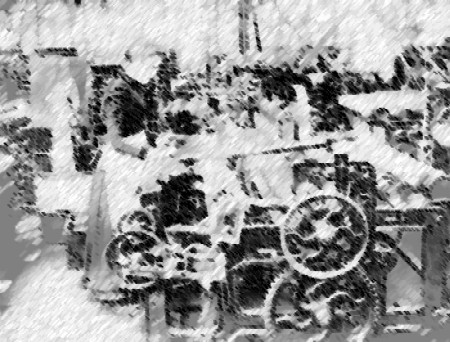
The noise, he realised, was entirely mechanical. The children never spoke to each other. They would have had to shout, anyway, and if they did so, then men with whips and scowls on their faces walked up and down the line discouraging anything other than endless work.
Luke walked slowly down the line of looms, wondering if he could actually be seen. It seemed not, since two of the scowling overlookers passed him without comment. He came to the far end and saw something even more frightening than the lines of ever moving looms. This looked like something out of hell itself, in so far as Luke had any concept of such things.
This was the part of the process where the newly made carpets were steam pressed in a huge, fiendish looking machine. He watched in awe as the ten foot square iron press came down on a section of carpet with a thud of metal and a hiss of hot steam that the child operators dashed away from. Many of them had red scald patches on their arms and faces that suggested they sometimes didn’t quite make it.
Then the press slowly raised and the youngsters turned a huge, heavy handle that wound the carpet on until a new piece was under the press. Small, agile children ran across it, barefoot, pushing down lumps and smoothing creases and removing any stray threads that might be on it before diving out of the way as the press began to descend once more.
Luke shivered as he imagined what could happen if one of the children didn’t get out of the way fast enough. He wasn’t sure which was the most gruesome part, being scalded by the hot steam or crushed by the iron press, but it would be a horrible death.
Then it almost happened. As he watched the procedure for the second time, a child, a boy, tripped, sprawling across the middle of the piece of carpet. The others watched in horror as the press began to descend. Luke opened his mouth to scream, but found himself unable even to do that much. He was paralysed by the horror of what he thought was going to happen.
Then a girl ran past, abandoning the loom she was supposed to be operating. She grasped a huge handle and pushed on it. A boy who looked a lot like Luke himself might look if he was skinny from lack of food, had his head shaven almost bald and was covered in oil from his job of greasing the ever moving machinery, ran to help her. Between them they applied the brake just in time to allow the boy to crawl out.
Then there was uproar. Two of the overlookers descended upon the three, demanding first of all to know why the girl had left her loom, which had now had to be stopped because she had not been attending the shuttle and several rows of weaving were completely wrong. They wanted to know why the boy had stopped greasing the machinery, and why the two of them had stopped the press, which now had to be manually winched back up, losing precious minutes of production time.
The fact that the carpet would have been completely ruined
if a squashed and scalded boy’s body had been pressed into it didn’t
seem to matter. The overlookers only cared that production had been halted,
shuttles astray, wheels not greased, carpets not pressed. Luke watched
as one of the rough men grabbed the small boy and prepared to thrash him
with his whip. 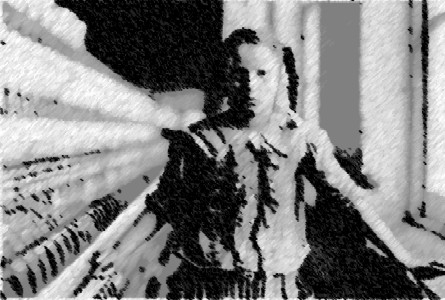
The girl moved quicker than a skinny, half starved, exhausted girl ought to have been able to move, and the older boy, too. The girl grabbed the whip. The boy kicked the overlooker in the back of the knee so that his legs collapsed under him.
Around them, other workers carried on weaving, carried on greasing. The press, having been winched up, slammed back down to steam press the carpet. Nobody else wanted to incur the wrath of the overlookers. They kept working and hoped not to be singled out for any mistake.
“OUT!” screamed the senior overlooker, and all three, the boy, girl and the small boy were pushed and propelled down the line towards the great doors that Luke had found locked and bolted before. They were unlocked and unbolted and the three pushed out into the snow, the boy barefoot, the other two wearing wooden clogs and the thinnest, poorest cotton clothes on a freezing, snowy night.
Luke dashed out behind them before the door was slammed shut. He heard the locks and bolts being drawn. He looked at the three children. The girl put her arms around the little boy. The older boy embraced them both as they began to shiver from the cold.
“Anne, what will we do?” the boy asked. “We can’t go back to the workhouse now. They won’t let us in.”
“We’ll…” the girl paused and tried to look through the driving snow. “We can stay in the old mill house until morning. It’s warm in there, amongst the stored wool. Oh, Michael, don’t cry. I know it’s cold. But we’ve only got to walk a little way.”
“I can’t even see the millhouse,” James told her as they started to trudge through the snow. “The snow is so thick.”
“Oh no,” Luke murmured. He could see it so easily now. He saw what must have happened to the three children. The ones Doris had spoken of. They were going to make their way to the millhouse. But even though it was only a short walk, they got disorientated. They came to the river and slipped into the icy water. They were already cold and he was sure nobody ever took them to a swimming baths to learn to swim. They would be dead in minutes.
“No!” he yelled. “No, wait. Look….
The snowmen. Use them as a guide. Follow the snowmen. Please, come back.
Wait.” 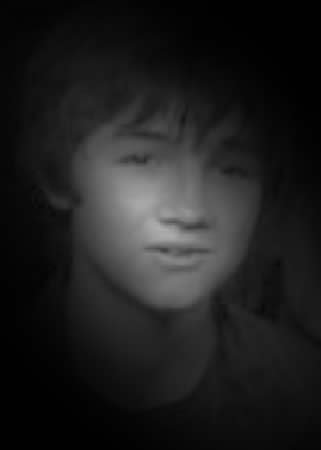
It was the small boy, Michael, who saw him first and tugged at the skirt of the older girl, Anne. She turned and saw Luke. He reached out and touched her shoulder, feeling how cold she was. He pulled off his coat and put it around her, and picked up the little boy. He felt so very light.
“Snowmen?” James asked. “What are….”
Luke was having trouble finding them himself. It really WAS terrible weather. But he managed to make out the solid shape through the snow and grabbing hold of Anne’s hand he aimed for it. James held her other hand and they reached the first snowman. Luke peered through the snow. He had built the snowmen for them. They had asked him, pleaded with him for help. And that had been his way of helping. But he was helping himself, too. Even though he knew where the millhouse was, without them to guide him he, too, could have ended up falling into the river.
“Come on,” he said as he aimed for the next snowman. “Stick close. Don’t let go.”
Nobody did. They clung to each other as Luke led them from snowman to snowman, down the long meadow towards the millhouse. At last he could see the dark bulk of the building through the snow. He reached out to touch the brickwork and then slowly worked his way around to the door. It wasn’t locked. It was on a latch. He lifted it and pushed the door open. They all stepped inside and he slammed it shut again.
It was dark inside. The building had no windows. But it WAS warm. He called out the three names and got weary but grateful responses as they felt around and found bales of warm wool, spun and dyed, ready to be woven in the factory into carpets. They lay down among the warm stuff gratefully. Anne asked if Luke wanted his coat back yet.
“No, you lie under it. Put the little boy next to you,” he said.
“He’s my brother,” she said. “That’s why I had to… the machine. It’s evil.”
“You’re all right now,” Luke said. He felt in his trouser pocket. He had a packet of sweets. Love Hearts. Maria and Clyde teased him, but he like the taste of them. He didn’t CARE what was written on them. He gave each of the three children some of the sweets and sucked one himself. They all lay quietly for a while and listened to the snowstorm outside.
“What will we do in the morning?” James said presently. “We can’t stay here. And we can’t go to the workhouse now.”
“When it’s light…” Anne decided. “We’ll go to Mr Denning. Do you remember him? The factory inspector. He came to look at the factory. When Mr Roker made all the little children hide in the storeroom and told him that we were all over fifteen. He was suspicious. And he thought that we were being worked too many hours. Do you remember… James… He said… if anyone is brave enough to speak up, to tell the truth in front of a magistrate…”
“None of us were,” James said. “We were afraid of being thrown out on the street to starve. Workhouse gruel is better than an empty stomach.”
“Well now we HAVE been thrown out,” Anne answered. “So we’ve got nothing to lose.”
“I think you should do that,” Luke said. “That
man sounds nice.” 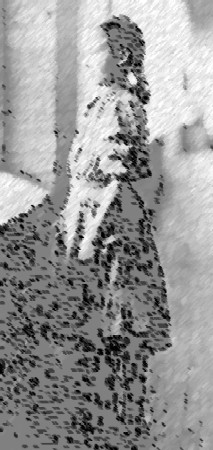
“Who ARE you?” Anne asked. “I saw you in the factory. Just standing there, watching. But the overlookers… they didn’t see you. It was as if you were invisible to them. To all the other children, too.”
“I think I might have been,” he answered. “I don’t really belong here. Something brought me here – to help you three, I think. I don’t know how I’ll get back, though. I HOPE…. I hope I can. I really want to be with my mum.”
“You’ve got a mum?”
“You don’t?”
“Ours died in the workhouse when Michael was born,” Anne said. “James never knew his. He was left at the gate, in a basket.”
“I was sort of found, too. My mum found me and made me her son. I suppose I’m lucky.”
A silence came over them all again. Michael fell asleep. But it was a safe kind of sleep, warm, not freezing to death outside. Anne snuggled beside him and let herself drowse away. James took longer. He was the oldest boy. He had to care for them. But soon he, too, fell asleep.
Luke made himself a sort of nest in the warm wool and did the same.
Sarah Jane woke up about six o’clock in the morning. It was still dark, and there was no point in waking anyone else up in the house, but she felt as if she couldn’t get back to sleep again. She decided to go downstairs and make a cup of tea.
She wondered if Luke was awake. He very often DID wake
up early. He didn’t seem to need as much sleep as other boys, and
she knew he would sit with his laptop and do maths problems or play logic
games to amuse himself. 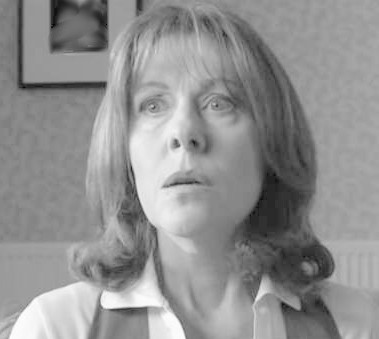
When she found that he wasn’t in his bed she wasn’t worried at first. Perhaps he’d gone to the bathroom. She went to put the kettle on and make a cup of tea. It would be nice to sit and chat with him quietly in the early morning.
The tea was made, though, and still no sign of him. She started to get worried. She checked the bed and could tell that it hadn’t been slept in.
She wasn’t sure what brought her to the window, but when she did she saw the row of snowmen.
“Luke… what have you done?” she said out loud. She found her shoes and her outdoor coat and went to the door. The cold hit her as soon as she stepped outside, but the snow had stopped and there was no wind. She saw the footprints leading in a direct line towards the millhouse, which was strange because he must have made LOTS of footprints building the snowmen, but there was only the one clear set, going away from the house.
She followed the prints all the way down to the old building where she had been yesterday with The Brigadier. She opened the door and looked inside and breathed a deep sigh of relief. Luke was there, fast asleep on the back seat of Bessie, his coat over him. He looked warm and comfortable. He just wasn’t where he should have been.
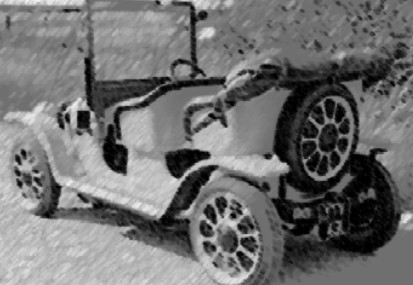 She
shook him awake. He opened his eyes and looked around as if he expected
to be somewhere else.
She
shook him awake. He opened his eyes and looked around as if he expected
to be somewhere else.
“They must be safe now,” he said.
“Who?” she asked. “No, never mind. Come on. Back to the house. What on Earth were you thinking of? Building snowmen in the middle of the night?”
“They needed me to do it,” he answered. But Sarah Jane shook her head. There was obviously a story he needed to tell. But she didn’t want to hear it until they both had a cup of tea.
“Here we are,” she said as she brought the tea tray into the drawing room. “Come on and sit down here on the sofa where it’s warm.” He turned from the window. She saw that he had the snowglobe in his hands.
“Do you remember yesterday… Doris told me about the three children who died in the river after being thrown out of the factory.”
“No,” Sarah Jane answered. “No, I don’t remember that. I remember her telling you about three children who escaped from the factory and testified about the way it was being run and got the factory closed down and the workhouse manager sacked.”
He looked puzzled for a moment, then he smiled as he understood.
“It all changed,” he said. “I helped them find the way. And it changed.” He drank his tea and held onto the globe and told Sarah Jane the whole story of what had happened during the night.
“I didn’t dream it,” he insisted. “Because the snowmen are there. And I was in the millhouse still. And look….” He showed her the snowglobe. She looked at it curiously. It was still the same scene, the millhouse and the factory. But there was a line of snowmen between the two buildings, and four sets of footprints following the line.
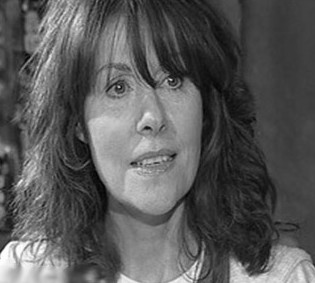 And
three figures standing by the millhouse. A girl and a boy and a smaller
boy. They were waving. And though the figures were only small, Luke was
sure they were smiling.
And
three figures standing by the millhouse. A girl and a boy and a smaller
boy. They were waving. And though the figures were only small, Luke was
sure they were smiling.
“I don’t think you were dreaming,” Sarah Jane said. “I think you really DID go back in time. It CAN happen. I think this globe had something to do with it. It called to you. To help them.”
“Why me?” he asked. “Doris and The Brigadier had the snowglobe for ages. And somebody else must have had it before them. So why me?”
“Because you were like them in a way. You were a sort of orphan. So they could reach out to you? I don’t know. Something like that.”
Luke nodded. He shook the snowglobe. It snowed inside. He looked outside. It WAS snowing in the real garden, but it had been doing that for at least twenty minutes while he was drinking tea and talking.
“I did it.”
“Yes, you did.” Sarah Jane hugged him tightly. “Well done. I’m proud of you. But tonight, please stay in bed, won’t you?”
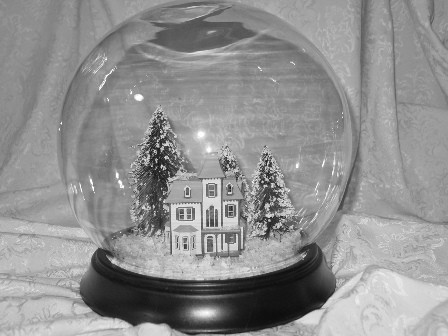
Next Week, a one off story featuring Maria - Underneath The Lamplight
 |
 |
 |